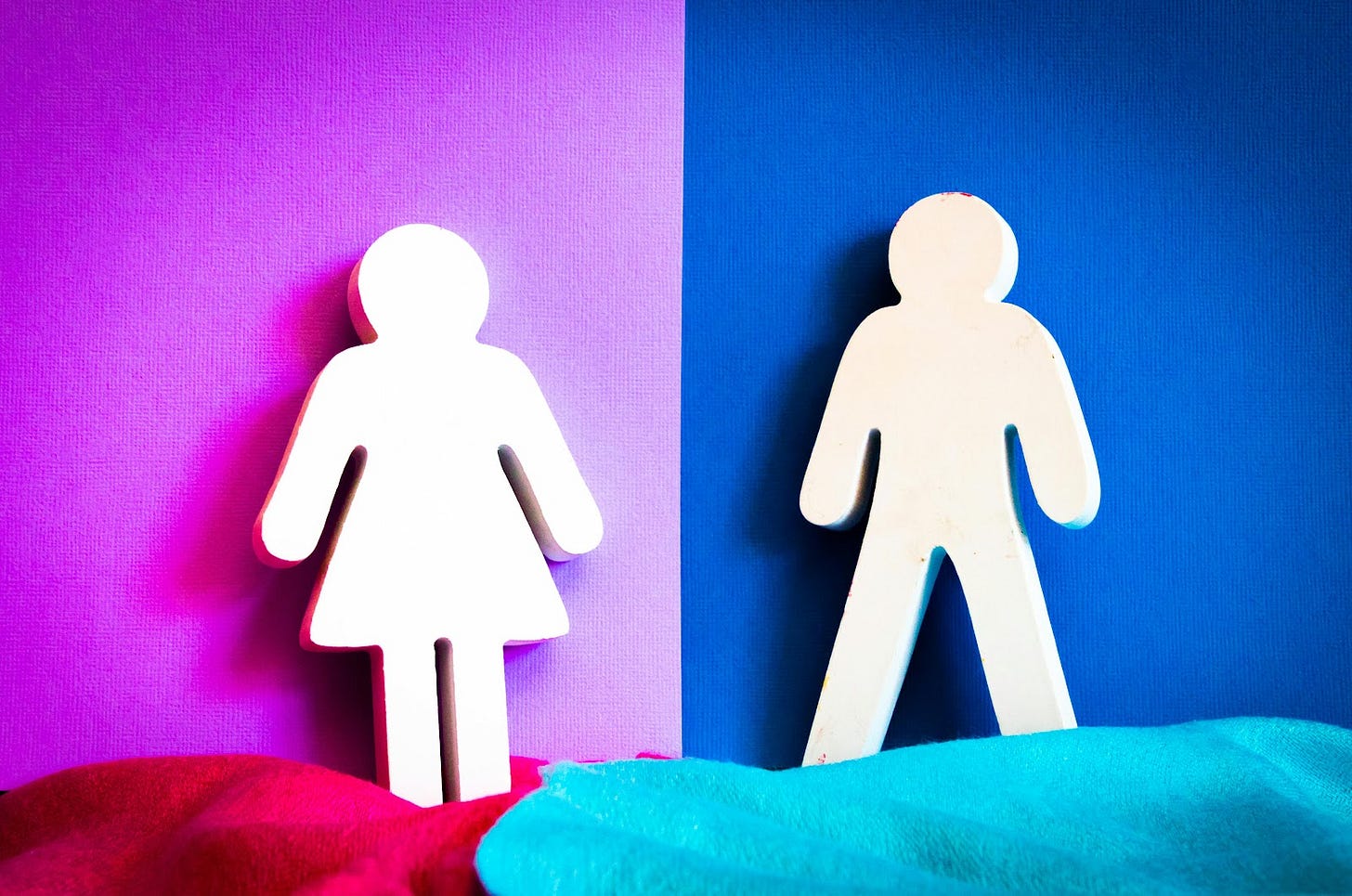As part of their war against our values of Diversity, Equity and Inclusion, the self-proclaimed free speech warriors of the Trump regime displayed their shameless hypocrisy by forbidding federal workers from including their personal pronouns in their email signatures. In recent years it has become more and more common for progressive people to conspicuously display their personal pronouns, and in the wake of Trump’s second election victory, there has been much hand-wringing about this practice. Should we continue to announce our pronouns? Is it just empty virtue signaling? Many people seem to find it offputting. Have we lost touch with “real Amercians”?
I will put off the political expediency of the practice till later in this essay, because first I want to make a moral argument for why we should all adopt, encourage and defend explicit declaration of pronouns. To begin the argument, consider the old customs regarding personal pronouns. We all operated on the assumption that we could determine a person's pronouns based on our own assessment of their gender presentation–how they look to us. Most of the time, well above 90% of the time I would guess, this worked just fine. The vast majority of people’s gender identity aligns with widely recognizable norms of gender expression–boys look like boys and girls look like girls, and we all know what that looks like.
Of course, people are diverse and not everyone fits neatly into the gender binary, so awkward situations arise. Traditionally, this has been played for laughs. The humorist David Sedaris has often made comedic use of the frequency with which he is mistaken for a woman on the telephone. Perhaps most famously were Saturday Night Live’s Pat sketches. From 1990 to 1994, Julia Sweeny portrayed the gender-ambiguous character Pat. In the sketches hijinks ensue as other characters try to determine Pat’s gender without committing the faux paus of outright asking their gender, for what could be more embarrassing–for you and for them–than mistaking someone’s gender? Hilarious, right?
The old customs make no space for people who don’t conform to traditional gender norms. And it turns out, those people weren’t ever as rare as we may have thought, for after all, when the world is hostile and cruel to people outside the norm, those people tend to hide for self-preservation. Rather than living authentically as themselves, many people try to miserably contort themselves to fit convention, often failing, not being man enough or woman enough to satisfy others’ expectations, and being ridiculed and tormented anyway.
And to whose benefit? Who actually benefits by forcing people into the gender binary? When I look around, it seems to me like society is in crises from the unbearable weight of gender expectations. The so-called “manosphere” is a cesspool and its denizens are not flourishing. The trad-wife movement is crashing on the shoals of patriarchy. The backlash against more progressive trends on gender has led to such intense adherence to a conservative gender ideology that even people whose authentic gender expression conforms to tradition are finding it oppressive.
Perhaps if we made a world where we were all free to live authentically as ourselves, free to experiment and discover our own gender identity, and then accepted and embraced as our true selves, we would all be a lot happier. Such a world would make space for traditional and non-traditional gender expression alike. To achieve that we need to make some small changes to our customs around pronouns, and let up on the ridicule and torment for the non-traditional sorts.
How do we make space for people whose pronouns or gender presentation don’t align neatly with tradition? Under the old custom of assuming we can read pronouns from appearances, we make it awkward to mistake someone’s gender identity, explicitly signaling that they failed to conform to our expectations–ala Pat. And for the exact same reason, we make it awkward to ask someone their pronouns, because we are again signaling that they don’t conform to expectations. So those customs need to change. First, we would need to stop assuming we can infer someone’s gender identity from appearances–even though most of the time we are able to do so correctly. And if we stop assuming we can read gender identity from appearances, we also have to stop expecting people to infer our own gender identities from our appearances–even though for most of us, our gender expression is as basic and obvious as a bathroom gender icon.
One step in that direction would be to make the question, “What are your pronouns?” as customary a conversation starter as “How are you?” Another step would be to normalize the practice of explicitly signaling our gender identity. We can state our pronouns in our email signature blocks, social media bios, and newsletter bylines. We can make it part of our standard introduction. “Hi, I’m Tucker. He/him.” A third step would be to use they/them as default pronouns anytime we don’t have a clear and explicit knowledge of a person’s self-determined pronouns. All of this might feel weird at first—customs are hard to change—but I promise, if you make an effort, eventually you won’t even notice that you do it. It will become custom.
Inclusivity is a value that follows directly from the humanist commitments to empathy and global awareness. The commitment to empathy is, “I will consider other people’s thoughts, feelings, and experiences.” The commitment to global awareness is, “I will be a good neighbor to the people who share the Earth with me and help make the world a better place for everyone.” Being inclusive means making reasonable accommodations for the thoughts, feelings and experiences of everyone–to make them feel welcome and included. A small change to our customs around pronouns helps to make a more welcoming and inclusive world for gender non-conforming people. It makes the world a better place for them–and I argue, for the rest of us as well.
And while we are being empathetic, we should also have empathy for those who bristle at this change of custom. Empathy is hard. Change is hard. Especially if you don’t see the necessity of the change. So in addition to changing our own behavior, we need to be advocates for inclusivity, and not scolds. Showing compassion towards those who may not agree can help us form relationships that allow for dialogue, and genuine dialogue is what is required if we are to encourage people to help us build a better world.
Now I will return to the question of good politics. It seems plausible that efforts to create a more inclusive world have, at times, hurt the progressive cause politically. After all, convicted felon Donald Trump won the popular vote in 2024, making gains across demographics traditionally central to the progressive coalition. His re-election represents the most significant threat to progressive values in generations—a total disaster unfolding in real time. We don’t yet know how bad things will get, but they are already pretty terrible. His victory appears, at least in part, to reflect a failure among progressives to meet people where they are.
When we get too far ahead of public opinion, we risk losing the public—and right now, we’re losing ground. Recent polls indicate declining support for LGBTQIA+ rights. We need to take responsibility for our role in that shift. There are many theories about what went wrong, but I want to defend the core principle that we have not erred in striving for a more inclusive world. On the contrary, our mistake may lie in the tone and posture of some of our advocates. I blame the toxicity of social media, but for whatever reason, too often those on our side come across as self-righteous scolds, lacking the compassion and patience needed to reach those who are struggling with or hesitant about change. Instead of dismissing disagreement as bigotry, we must engage with empathy and win people over with reason and care.
It’s also essential to recognize that there is an organized and deliberate opposition exploiting trans people to gain political power and advance an unpopular Christian nationalist agenda. On a recent episode of Stacey Abrams’ podcast Assembly Required, journalist and TransLash Media founder Imara Jones explains how Christian nationalists have methodically tested messaging to exploit discomfort around trans issues in order to win close races.
We can’t respond to this by retreating—we must contest that space with the same care and strategic thinking. We need to win the argument, and we need to do it with compassion and generosity of spirit. Our goal must be to show those uneasy with shifting gender norms that the inclusive world we envision is one in which they, too, can thrive.
There is a staggering amount of misinformation circulating about these issues. We need to educate ourselves about what is true, and then engage others honestly and empathetically to set the record straight—and win them to our side. We cannot allow past losses to convince us that standing in solidarity with those outside of the gender binary is a losing issue. We have to try harder to bring others to our side, and I believe that if we lead with empathy, we can win.
Finally, I want to share a recent episode of the Ezra Klein show in which the first trans person to serve in congress, Sarah McBride, speaks eloquently on these issues.





I have always wondered people made such a big deal about pronouns. How hard is it to do that small kindness for someone? It's not hard at all. And I agree that we cannot respond by retreating. If anything we need to double down. Love, kindness and empathy will win the day.